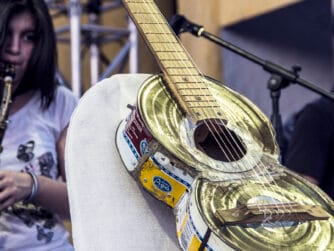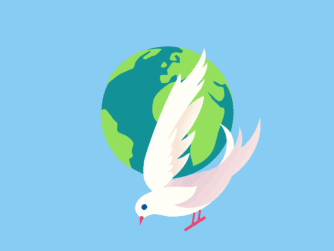Voice 1
Welcome to Spotlight. I’m Katy Blake.
Voice 2
And I’m Colin Lowther Spotlight uses a special English method of broadcasting. It is easier for people to understand, no matter where in the world they live.
Click here to follow along with this program on YouTube.
Voice 1
Zahra Nooristani is an 18-year-old woman. She is wearing a traditional black headscarf to cover her hair. She is also wearing a blue coat and trousers. On the back of her coat there are large white letters. The letters write the word ‘Afghanistan’.
Voice 2
On this day, Nooristani is learning to rock climb. The city of Kabul is behind her and far below. She hangs off the side of the tall mountain. She holds a long rope in her hands. Another rope is around her waist. Her feet press against the side of a large rock.
Voice 1
A man stands at the top of the mountain’s edge. He shouts down at her. He is telling her how to lower herself down safely. Nooristani is worried. But slowly, she begins to move down the rock.
Voice 2
Nooristani is one of 13 women learning to climb. They are Afghanistan’s first ever rock-climbing team. Today’s Spotlight is on their team, Ascend: Afghanistan.
Voice 1
Nooristani’s climbing team is part of an organization called Ascend: Leadership Through Athletics. Marina LeGree started Ascend in 2014. LeGree is an aid worker from the United States. But she lived and worked in Afghanistan for many years.
Voice 2
In 2008, LeGree began working with an all-women’s basketball team in Afghanistan. Before this, she did not know that Afghanistan had any women’s sports teams. She enjoyed the experience. However, she also recognized a great need. Women wanted to play sports. But they did not have many resources, or coaches to teach them.
Voice 1
In 2009, LeGree heard about a team of climbers that climbed Afghanistan’s highest mountain. Two of the climbers were Afghan men. They were the first Afghans to ever climb Mount Noshaq! This was a great achievement. LeGree decided she wanted to help Afghan women achieve the same honor.
Voice 2
So, LaGree began Ascend. The goal was easy – to train a group of young, Afghan women to climb the highest mountains in Afghanistan. However, finding girls and young women to join the team was not as easy. Many young women were interested in the program. But their families were not.
Voice 1
For many years, a political group called the Taliban ruled Afghanistan. Their laws restricted women in many ways. Women could not work, drive or go to school. And they could not leave their homes without permission from a male family member.
Voice 2
The Taliban lost power in 2001. Today, women have more freedom and more rights. However, Afghan culture is slower to change. There is still conflict in Afghanistan with the Taliban. The Taliban still has influence. This conflict continues to restrict women’s rights in the country.
Voice 1
So, when LeGree and her team began looking for climbers, they struggled. Many families supported their daughters’ desire to mountain climb. But they worried about their daughters’ safety. They worried about the Taliban.
Voice 2
LaGree and the Ascend workers took time to build trust with many of the girls’ families. And by the autumn of 2014, they had gathered a team of 13 young women. Today, the climbers are between the ages of 16 and 22. And they are excited about climbing.
Voice 1
Nargis Azaryun is one of the older team members. She is also Ascend’s program coordinator. She told National Public Radio why she loves climbing. She said,
Voice 3
“Climbing feels amazing. It feels like you are just born and you have a chance to rule the world.”
Voice 2
But learning to mountain climb is not easy. The women have to run, climb, lift heavy weights and train hard. All of this is made more difficult because of a lack of resources. The girls use old ropes and equipment. And they train in Kabul’s Ghazi Stadium. This sport arena is well-know – but not for good reasons. The Taliban used to perform public killings in the stadium. In the past, many women died there because they broke the Taliban’s extreme laws.
Voice 1
But even with all these difficulties, the young women come to train every day. They understand the importance of achieving such a major goal. They also come because Ascend provides the girls with more than just training.
Voice 2
Every Ascend climber also takes classes in conflict resolution, leadership, and mental health. This may seem unusual, but mountain climbing requires much more than physical strength and technical skill. Climbers must work together during long and dangerous climbs. They must be able to solve problems in extreme situations. And they must be able to lead when it is their turn.
Voice 1
Ascend wants to help these young women become leaders on and off the mountain. Rabia Nooristani is another climber from the Ascend team. She is the younger sister of Zahra, from the beginning of this program. She talked with National Public Radio about climbing and the progress they have made in the last year.
Voice 4
“There is freedom here… The first time I climbed was really difficult. Someone had to pull me up the mountain by hand.”
Voice 2
Like Rabia, all the young women have learned a lot. One year ago, many of them had never climbed a mountain. But on August 6th, 2015, the women began their first major climbing trip. They had wanted to climb Afghanistan’s highest mountain. But there was fighting near the base of the mountain that made it unsafe. So instead, they climbed several mountains in northeast Afghanistan. These mountains were more than 5,000 meters tall. The women of Ascend climbed higher than any Afghan women ever had before!
Voice 1
Ascend is also proud of the achievements the women have made away from the mountains. A few months before their climb, team members spoke at a school. They talked to a class of 16 and 17-year-old girls. They told the girls about their goal – to climb higher than any other Afghan women. And they encouraged the students to work toward their dreams – even if they want to do something women do not normally do. Team member Soheila Hamidi said,
Voice 5
“Can a women become a law expert? Can a women become a parliament member? Can a woman become our president?.”
Voice 2
The women of Ascend have climbed higher than any Afghan woman before them. But now, they are also leading another generation of Afghan girls to achieve even more!
Voice 1
The writer of this program was Robin Basselin. The producer was Michio Ozaki. The voices you heard were from the United States and the United Kingdom. All quotes were adapted for this program and voiced by Spotlight. You can listen to this program again, and read it, on the internet at www.radioenglish.net. This program is called, ‘Female Climbers in Afghanistan.’
Voice 2
We hope you can join us again for the next Spotlight program.
Goodbye.
Question:
“Can a women become a law expert? Can a women become a parliament member? Can a woman become our president?.”








Obviously yes.
Yes.
Yes.
Next time
Yes, they can! But it is difficult for the women than men.firstly the rules are helps men ,.
Yes. But this kind of job is hard even for a man.
Sorry but what talban did it isn’t worse than what American soldiers did.and also I don’t believe western media. it isn’t telling the truth . I am supporting them. Afghanistan it is their land and they have the right to do what they want there. Best wishes
Yes, a woman can become whatever she wants…
A woman can become a law expert like TOUNSI Sabrina from Algeria
A woman can become a parliament member like louiza hanonne from
A woman can become president like Tarja Halonen from
Nice story